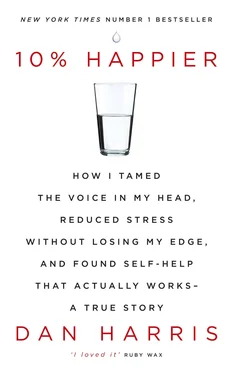My nose is running savagely. I don’t have anything to wipe it with. I blow it into my hand and walk, dripping snot, to the nearest bathroom, laughing goofily.
I take a run. I’ve been doing this most afternoons. I’ve found a little route that goes through an adjacent horse farm and out into the local neighborhood of upper-middle-class homes. I’m still high. As my feet pound, I’m crying, then laughing at myself crying, and then crying some more. I’m wondering whether this is the start of a different way of being in the world for me, one where—as Brilliant Genius Spring has described—you train yourself to have compassion rather than aversion as your “default setting.”
I’d be loath to call what I’m feeling spiritual or mystical. Those terms connote—to me, at least—otherworldliness or unreality. By contrast, what’s happening right now feels hyperreal, as if I’ve been pulled out of a dream rather than thrust into one.
After dinner, it’s Goldstein giving the dharma talk. He’s making an intriguing point. The Buddha’s signature pronouncement—“Life is suffering”—is the source of a major misunderstanding, and by extension, a major PR problem. It makes Buddhism seem supremely dour. Turns out, though, it’s all the result of a translation error. The Pali word dukkha doesn’t actually mean “suffering.” There’s no perfect word in English, but it’s closer to “unsatisfying” or “stressful.” When the Buddha coined his famous phrase, he wasn’t saying that all of life is like being chained to a rock and having crows peck out your innards. What he really meant was something like, “Everything in the world is ultimately unsatisfying and unreliable because it won’t last.”
As Goldstein points out, we don’t live our lives as if we recognize the basic facts. “How often are we waiting for the next pleasant hit of . . . whatever? The next meal or the next relationship or the next latte or the next vacation, I don’t know. We just live in anticipation of the next enjoyable thing that we’ll experience. I mean, we’ve been, most of us, incredibly blessed with the number of pleasant experiences we’ve had in our lives. Yet when we look back, where are they now?”
It’s so strange for me to be sitting and listening to what is essentially a sermon, complete with quotes from a sacred text, and to be genuinely moved. After all those years of being the only nonbeliever in a room filled with rapt devotees, here I am sitting and taking notes, totally engrossed, nodding my head.
I mean, he’s so right. In cartoons, when the characters slurp down some delicious food or drink, they smack their lips and seem totally sated. But in the real world, it doesn’t work that way. Even if we were handed everything we wanted, would it really make us sustainably happy? How many times have we heard from people who got rich or famous and it wasn’t enough? Rock stars with drug problems. Lottery winners who kill themselves. There’s actually a term for this—“hedonic adaptation.” When good things happen, we bake them very quickly into our baseline expectations, and yet the primordial void goes unfilled.
Goldstein makes clear, as he did the other night, that he’s not saying we can’t enjoy pleasant things in life. But if we can achieve a deeper understanding of “suffering,” of the unreliability of everything we experience, it will help us appreciate the inherent poignancy of everything in the world. “It’s like we’ve been enchanted,” he says. “We’ve been put under a spell—believing that this or that is going to be the source of our ultimate freedom or happiness. And to wake up from that, to wake up from that enchantment, to be more aligned with what is true, it brings us much greater happiness.”
On retreat, with nothing to look forward to, nowhere to be, nothing to do, we are forced to confront the “wound of existence” head-on, to stare into the abyss and realize that so much of what we do in life—every shift in our seat, every bite of food, every pleasant daydream—is designed to avoid pain or seek pleasure. But if we can drop all that, we can, as Sam once said in his speech to the angry, befuddled atheists, learn how to be happy “before anything happens.” This happiness is self-generated, not contingent on exogenous forces; it’s the opposite of “suffering.” What the Buddha recognized was a genuine game changer.
After the final meditation of the night, as I leave the hall, I turn around toward the Buddha, and—I can’t believe I’m doing this—I bow.
Day Six
I wake up, and the world is still magical.
I’m becoming almost frighteningly alert. My senses are heightened, like in the movies when a mortal starts turning into a vampire. After breakfast, as I walk back up the hill, I can hear the mice scurrying underneath the brush alongside the path. I have a freakish attunement to the communications within the hidden society of birds in the trees.
Meditation is still easy. I start by doing a round of breath-focus, which is like filling a hot-air balloon; once the mind is fully inflated with concentration, I just let it fly into choiceless awareness.
Urge to scratch.
Image of a row of baboons sitting on bales of hay.
Thought of the illicit apple I’m hiding in my room.
Even “bad” stuff doesn’t seem to really get to me. I can feel myself playing with the cape of pain draped over my back. I’m investigating it, without letting it truly bother me.
At lunch, I realize that I’ve now become one of these people who chews with his eyes shut. Eating mindfully, I actually put the fork down between bites rather than hunting around the plate while I’m still swallowing. As a result, I stop eating when I’m full, as opposed to stuffing my face until I’m nearly sick, as I usually do.
I spot a guy on the other side of the room who seems to be enjoying his meal immensely. I experience a sudden upsurge of what the Buddhists call mudita, “sympathetic joy.” It’s so strong I almost start blubbering again. It happens once more when I look up and see three women helping one another get the remaining chai out of the big metal pot in which it’s served. This tableau of silent, awkward, eyes-averted cooperation fills my eyes to the rim.
But then, as quickly as it came, the rapture evaporates.
The afternoon meditation session is a humbling reversion. Sleep beckons with the unwanted seductiveness of a clingy ex-girlfriend. At times, I nod off for a nanosecond, and then come to with what feels like a jackhammer to the head. At the end of forty-five minutes, I have a massive headache. It’s official: the magic is gone.
The afternoon metta session leaves me cold.
During the last sitting of the day, I am hit with a sickening jolt of restless energy so strong that it feels as if it might leave my limbs palsied. It gets so bad that I do the heretofore unthinkable. I resort to the one measure that, despite all the preceding difficulties, I have not yet employed: I give up. I open my eyes and sit in the hall, looking around guiltily.
Day Seven
Now I’m back to counting the days until I can leave. The thought crosses my mind that maybe I’ve gotten all I’m going to get out of this experience.
I’m still bowing to the Buddha, but mostly for the hamstring stretch.
Day Eight
I’m on the schedule to see Goldstein this morning. I arrive full of piss and vinegar; he’ll be the first person I tell about my recent meditative attainments. I practically bound to my seat, and give him a full report on my breakthrough: the choiceless awareness, the hummingbird, the metta-induced weeping.
I don’t know what I’m expecting. Applause, maybe? As it turns out, he’s pretty much unimpressed. He smiles and gently tells me he’s heard this story a million times. This is, like, First Retreat 101.
Читать дальше












